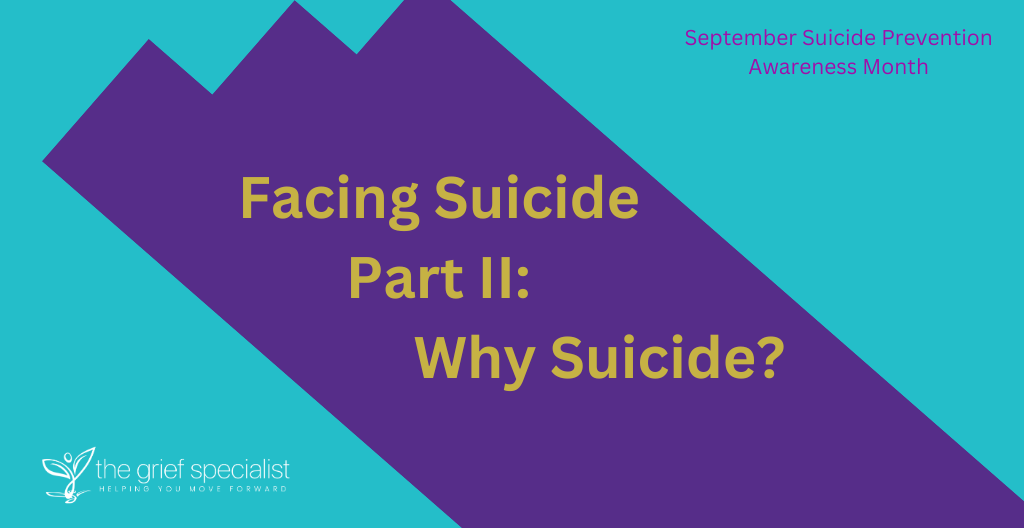My son killed himself! Why???
Why was my initial burning question. My son showed no sign of desperation or at least I thought. After talking to his friends, or you might call it interrogating them, I put together pieces that in hindsight indicated his despair and frustration with his life circumstances. Even then, I was confused. I loved my son, and he knew it. Why didn’t he talk to me? Why didn’t I see the signs? What caused him to think that killing himself was the solution? So many unanswered questions. The best thing I knew to do was to learn more about suicide.
Last week, I introduced who, what when, where, and how suicide happens. This week, we dive into helping you understand possibly why your loved one took their life.
Why Suicide
Why? This is the million-dollar question. It can leave suicide loss survivors scratching their heads and looking for answers. From my experience and research, I found the following list of potential reasons for their decision. Often, it is the result of long-term difficulties with thoughts, feelings, or experiences that the individual feels they cannot bear any longer. Among other things, a person contemplating suicide may feel:
- Sadness or grief
- Shame
- Worthlessness
- Intense guilt
- Rage or a desire to seek revenge
- That they are a burden to others
- That they have no worth or value
- That life is not worth living
- That they are trapped, either physically or emotionally
- That things will never get better
- Intense physical or emotional pain
Many factors can contribute to a person feeling this way. It may be due to events happening in their life. Perhaps:
- The loss of a loved one
- Bullying, discrimination, or abuse
- The end of a relationship
- A major change in life circumstances such as divorce, unemployment, retirement, or homelessness
- Receiving a diagnosis of a life-changing illness
- Problems with money
- Being in prison
- Pregnancy or pregnancy loss
- Questioning one’s sexual or gender identity in an environment that is not accepting of this
- Certain cultural practices such as forced marriage
Why did your loved one commit suicide? The answer will not be revealed. You can guess and presume what the issues were. The fact is you will never know the 100 percent truth. Know that asking why is normal and that, at first, it may feel impossible to ever get beyond that question. Eventually you will find a way of thinking that you can live with or accept.
Often times, loss survivors turn inward, blaming themselves and feeling guilty, asking, “Why Didn’t I See the Symptoms?”
Why Didn’t You See the Symptoms?
As I work with suicide loss survivors, many tell me they were blindsided by their loved one’s decision to end their life. I felt the same after my son died. Understandably, he was establishing a new routine because he recently moved. His new home was with long-time friends, his dog Mac was with him, and he was working a satisfying job. The latest work schedule was exciting and challenging. We texted back and forth about customer service, asking questions, and working with a mentor. He worked in the building next to his sister, and they spent a lot of time together. She saw his happiness. His cousin also spent time with him. The last time he and I spoke, he told me he was looking forward to Christmas. He did not want presents. All he wanted was my support. I assured him I would support him. As a young man, he had typical struggles but nothing that raised red flags or concerns that he was contemplating ending his life.
The clues that someone is feeling depressed and anxious are often concealed. Connor did not share his feelings and let others know that he was in a dark place. I believe this is for one of two reasons or a combination:
- He did not want to burden others with his problems. He was the kind of guy who worked things out on his own and took responsibility for his life circumstances.
- He did not recognize that his pain was so bad that he needed help. Sometimes you do not know that you need help. If you think you do not need help, then you do not seek it. But help is really what makes a difference.
Suicide is messy, complicated, and different than other modalities of death. Here are a few things that contribute to the complexities for those of us who are bereaved by suicide:
- Survivors are left with a need to find answers.
- Survivors, especially parents, want to take responsibility for their child’s death.
- Survivors experience high levels of guilt.
- There is social stigma around suicide.
- The loss of someone close to suicide increases the risk of those close to them choosing suicide.
- Unlike other nonviolent deaths, the loss of someone by suicide can lend itself to traumatic stress or posttraumatic stress disorder (PTSD).
- Survivors feel a lack of control.
- Dreams and hopes for the future are lost for both the deceased and bereaved.
- Suicide is traumatic to the brain and body of those left in its wake.
- It is difficult to find support for survivors of child loss by suicide.
- Survivors tend to focus on how their loved one died rather than the life they lived.
- Some believe taking one’s own life is a sin.
- Some may feel ashamed that their loved one took their life.
- Often, survivors want to hide the fact that it was suicide.
- Survivors may feel angry at the deceased.
- Parents, especially, may feel guilty whenever they find themselves being happy or experiencing joy.
- Others expect the survivor to quickly “get over it.”
- Child loss is the elephant in the room — it is an enormous, weighty topic, but no one speaks of it.
- Child loss by suicide is an even larger elephant in the room.
This is a summary of possibilities of why your loved one chose suicide. It is not an all-inclusive list; however, it can bring a degree of understanding of their decision. It is my hope that this helps answer questions and eases your pain. From my experience, learning about suicide was paramount in walking my grief journey and the path to recovery.
This wraps up helping you identify suicide with who, what, when, where, how and why suicide. Next week, you will learn the warning signs of suicide and how to help whose who are suicidal.
Together, we will travel through Suicide Awareness and Prevention month. Visit Blog – The Grief Specialist for Facing Suicide Part I: Understanding It.
You could change a life, possibly even save one.
Peggy
#helpingyoumoveforward
#suicideprevention
#resilience
#suicidelosssurvivor
#mentalhealthhelp
#whysuicide
#surviveyourchildsuicide




